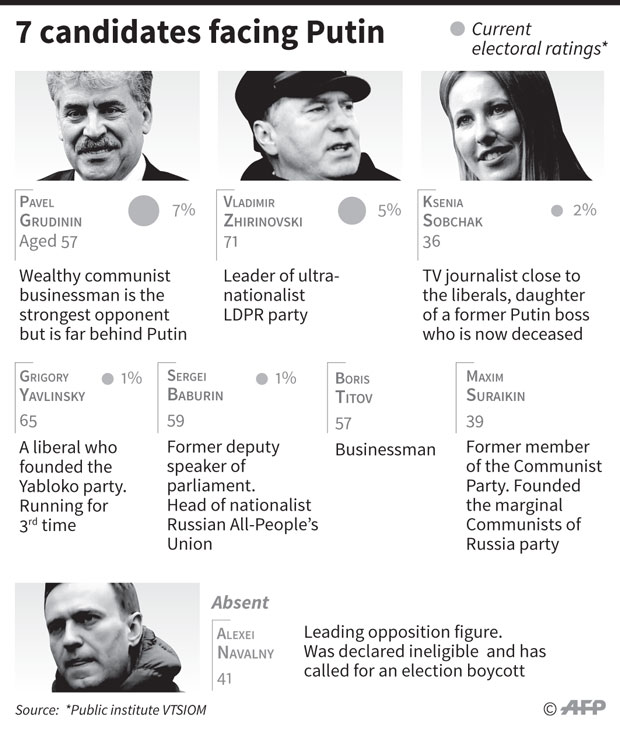Reply To:
Name - Reply Comment

 The seemingly eternal President of Russia, Vladimir Putin, has an iron grip on his nation and a foreign policy to match. A large majority of Russians give him their support. He will win re-election.
The seemingly eternal President of Russia, Vladimir Putin, has an iron grip on his nation and a foreign policy to match. A large majority of Russians give him their support. He will win re-election.
Is it his early economic success? Or is it because of a new stability? Or the nation’s growing self-respect after the ignominious years that followed the collapse of the Soviet Union? Or is it a sense of besieged defensiveness because of the advantage the West took of Russia afterwards.
The answer is a bit of all these.
Few in the West seem to talk about what happened after President Boris Yeltsin pushed aside Mikhail Gorbachev, the last president of the Soviet Union. Few recall the political and economic upheavals of that time and why the stability of Putin’s governance is welcomed by people at large.
His main opponent on the campaign trail is Kaenia Sobchak, 36 years old, a TV personality, and the daughter of Putin’s best friend (now deceased). She is outspokenly critical, even on the issues of Ukraine and Crimea
Perhaps it is because this was a quarter of a century ago and many people now ruling the West and the journalists who report on them were only in their twenties at the time.
Immediately after Gorbachev’s fall two things happened. Under the influence of misguided, radical, Western free-market economists price controls were lifted. The price of food rose by 500%. Later inflation soared. Second, the US sent a Treasury team to Moscow to check on whether the new Russia would pay back the Soviet debt without a word on economic aid. (Compare this with the enormous economic help offered defeated Germany and Japan at the end of the Second World War.)
In March, 1993, Yeltsin went on TV to announce he was suspending the unhelpful and recalcitrant parliament and called for new elections. The vice president, Alexander Rutskoy, and parliamentary members attempted to impeach Yeltsin. Yeltsin retaliated with a referendum when he won a slim vote of approval but in a low turn out.

In September, Yeltsin dissolved the Duma (parliament). In response 200 deputies occupied the building, voted to strip Yeltsin of the presidency, swore in Rutskoy as president and armed themselves. Yeltsin ordered a shelling assault on the parliament building. Yeltsin, the “democrat”, was photographed wielding a machine gun. The rebellion was put down. Yeltsin called for elections. With the aid of drugs to keep him going and a lot of American help- “interference” in today’s jargon- that ranged from advertisements designed to be shown on Russian TV to money for candidates, he unexpectedly won re-election.
Victorious, Yeltsin warned against the expansion of Nato, despite owing his victory to US help.
In December of that year the long war in Chechnya began.
The war dragged on, the economy was in dire straits and in the parliamentary elections a year later the Communist party looked set for a major rebound. Yeltsin’s party managed a narrow victory, again with Western help.
In the 1990s Yeltsin changed his prime ministers frequently, searching elusively for competence. The national debt rose, pensioners were not being paid and workers were owed nine billion US dollars in unpaid wages. In August 1998 the ruble crashed. Many banks and businesses went into liquidation.
It was in August 1999 that Yeltsin appointed yet another prime minister- Putin. On December 31st Yeltsin resigned, having struck a deal that if he made Putin president that his family would be protected from prosecution.
Putin’s achievement was to revive the economy. Inflation came down, pensions were paid and incomes increased by an average 250%.
However, on his watch, Chechen gunmen took 800 hostages and 130 of them died when Special Forces made a mess of a relief operation. Later terrorists seized a school and hundreds of children, parents and teachers died in another botched rescue operation.
Nevertheless, after the vicissitudes of the Gorbachev and Yeltsin years, on the main issues that preoccupy most people, Putin seems to be a leader who gets on top of problems.
State controlled newspapers and TV stations help ensure popular support.
However, there remain a sophisticated, independent, nation-wide, radio station, also a TV station, and one middle-of-the-road one. There is also an independent upmarket newspaper and access to international TV and radio stations, the web, and plenty of bookshops which sell all and everything.
For now Putin’s support has put down deep roots. The West must understand why. It’s far more than the popular take over of Crimea or the meddling in Ukraine.
His main opponent on the campaign trail is Kaenia Sobchak, 36 years old, a TV personality, and the daughter of Putin’s best friend (now deceased). She is outspokenly critical, even on the issues of Ukraine and Crimea. In public appearances she comes over as an intelligent critic. She said recently, “Politics here is like a casino. The house always wins.”
But now Russia, after years of being bashed by the West, is in a very nationalistic mood. Nobody can beat Putin, who radiates assertiveness. But Sobchack is the person to watch in future elections.
Note: For 17 years the writer has been a foreign affairs columnist and commentator for the International Herald Tribune/New York Times.